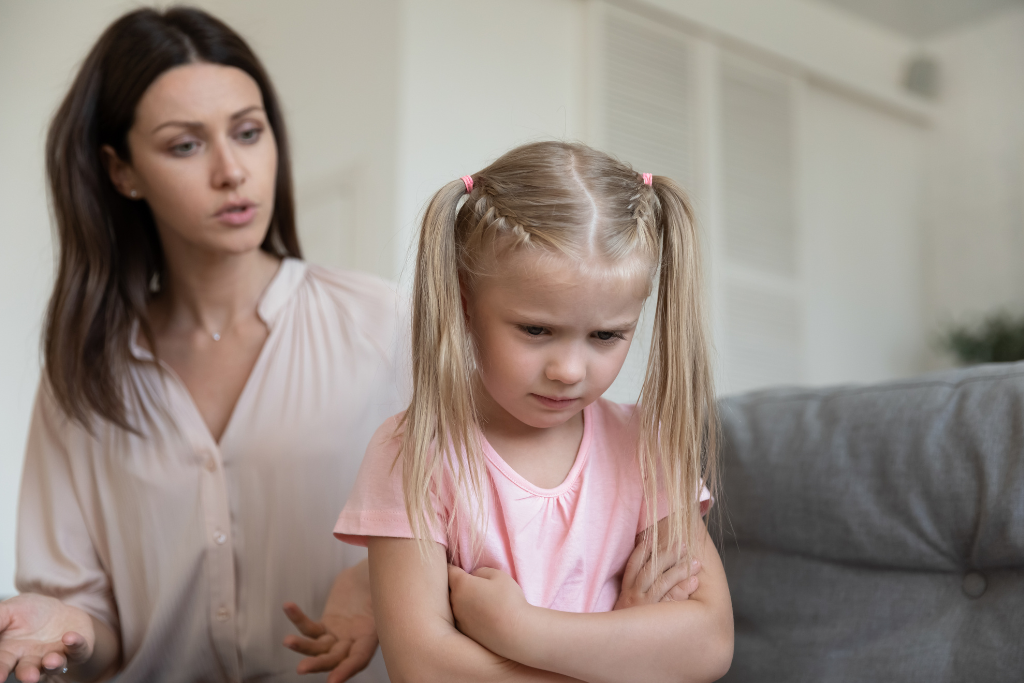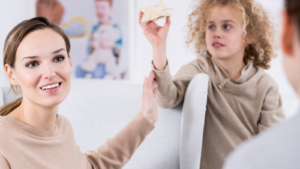Behavioral inhibition or lack of impulse control will prevent children from learning at higher levels or developing executive functioning skills. When kids are impulsive, they just aren't present at the moment because they are two steps ahead in something else. As a result, they aren't connected and regulated enough to think or pay attention.
Response inhibition is the foundation of learning and executive functioning. More simply, consistent action will be easier if children can control their responses. When kids are impulsive, school and home tasks become difficult to accomplish. They have problems listening, regulating emotional states, transitioning, or switching attention. Of course, having an impulsive child means parenting is harder, too, because you both get irritated by the need for so much support.
Children may have hyperactive-impulsive ADHD (Attention Deficit Hyperactivity Disorder) if they have trouble paying attention, feel restless, and give in to impulses easily. While it might seem challenging, managing impulsivity issues is possible.
Examples of Impulsive Behaviors
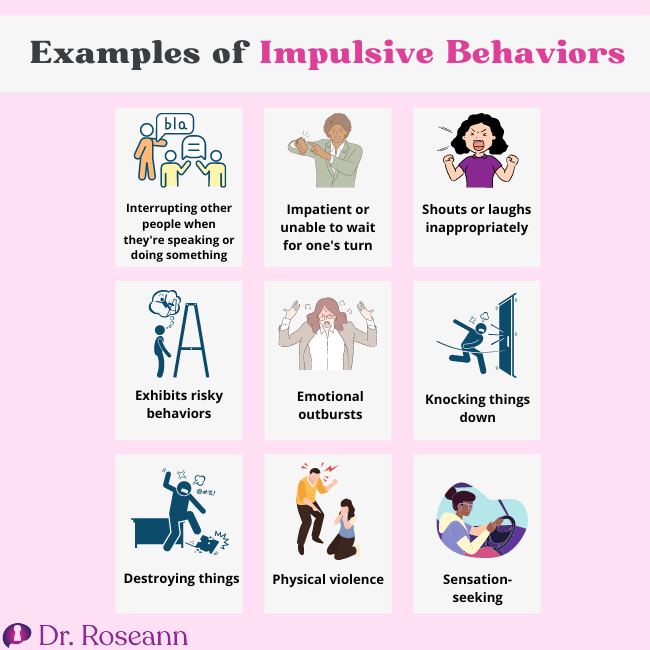
- Interrupting other people when they're speaking or doing something
- Impatient or unable to wait for one's turn
- Shouts or laughs inappropriately
- Exhibits risky behaviors
- Emotional outbursts
- Knocking things down
- Destroying things
- Physical violence
- Sensation-seeking behaviors
Ways to Correct Impulse Control Problems in Kids
Controlling your child's impulses can be difficult, but it's possible. Shaping and reinforcing desired behaviors and supporting healthy coping skills are key to lifelong mental health. It requires patience, but building on micro wins is how you get macro change.
Madeline's impulsivity showed up in every aspect of her life, and her parents were exhausted from trying to support her. Once we calmed her nervous system with CALM PEMF™, we worked with Madeline's parents on behavioral goals and reinforcing specific behaviors to optimize learning.
Over time, they tackled the small behaviors, and Madeline experienced dramatic behavior changes in school and at home. For the first time, parent-teacher conferences were pleasant, and Madeline got birthday party invites!
Participating actively in your child's treatment can most certainly improve the quality of their everyday life. Consulting with mental health professionals, such as in our BrainBehaviorReset™ Program, is the first step because they can provide parents with helpful impulse control strategies. The following tips may lead to possible solutions:
#1 Make your child aware of their impulsive behavior
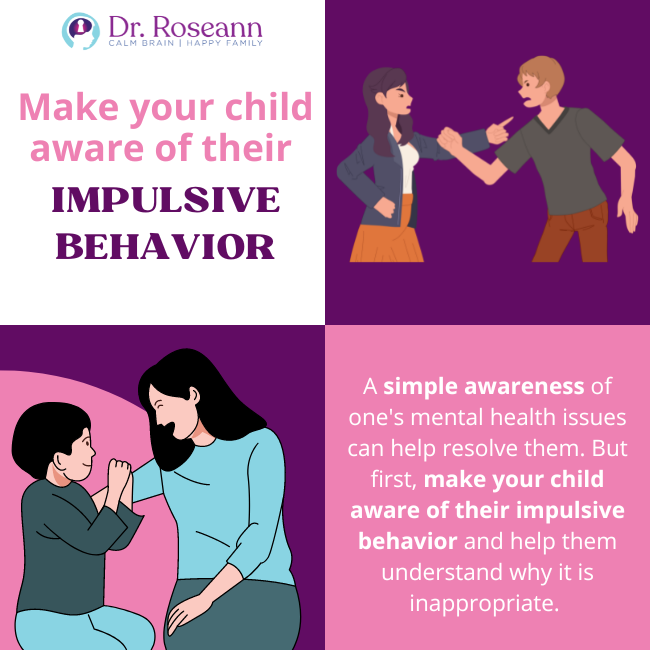
A simple awareness of one's mental health issues can help resolve them. But first, make your child aware of their impulsive behavior and help them understand what they need to do instead.
According to one research, impulsivity is associated with a delayed awareness of voluntary action. This study found that the short delay between conscious intent and action may interfere with the conscious ‘veto' of upcoming actions in impulse control disorders (Giovannelli et al., 2016).
Correcting impulsive behavior in your child should be done calmly and helpfully without negatively affecting their self-esteem. Do not make your child feel like they are the problem. Instead, communicate to them that they can focus on solutions for what they need. When kids feel confident about their decision-making skills, they are more likely to make good independent choices.
#2 Practice mindfulness and meditation
Developing your child's self-awareness will help them control their impulses. The more we are connected to the present moment, the more in control we are of our behavioral responses.
Teach your child to focus on their thoughts, emotions, and urges. Let them know how their body feels when they're about to be impulsive. Keep an open mind and observe what is happening around your child without judging.
At first, it might not seem easy. For example, children may not realize that they have an impulsive nature. But their impulsive behavior may be identified with proper guidance from their parents or mental health practitioner. In addition, practicing mindfulness helps children, teens, and young adults distance themselves from their impulses.
Encourage them to recognize urges before acting impulsively. First, find out what action the emotion is causing your child to take. Then, make a plan to stop their impulsive behavior. Speak with compassion, support, and encouragement.
Meditation is an effective method for managing one's internal dialogue. This practice involves concentration and self-regulation. Meditation consists of paying attention to the senses and being fully present. When meditating, you teach your child to focus on the present moment and are less likely to be impulsive.
Meditation also helps your child become more aware of their feelings and thoughts. This process allows them to recognize what might be an unproductive state of mind so that they can take deep breaths before they act.
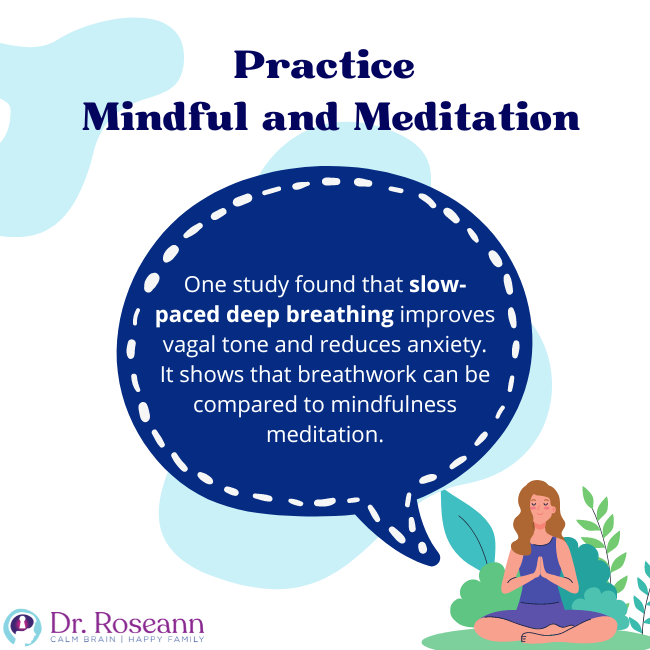
One study found that slow-paced deep breathing improves vagal tone and reduces anxiety. It shows that breathwork can be compared to mindfulness meditation. Heart rate variability training increases through meditation and breathing 5 to 6 breaths/minute. This effect is comparable to an FDA-approved electronic biofeedback device. It's also possible to achieve a much more significant impact through breathwork and meditation (Nidhi, 2023).
#3 Propose alternative behaviors
Educate your child on how to cope with impulsive behavior. For example, when your child wants to interrupt you, teach them to put his hand on your arm and wait for you to acknowledge him before speaking. Eventually, with reinforcement and practice, the brain will form a healthy behavioral association, and the less desirable behavior will dissipate.
If your child is inclined to attack or kick other children, encourage her to take out their aggressive behavior in different ways, such as biting a pillow or kicking a ball. Doing so will help them release tension without causing problems or harming others.
#4 Follow up and take action
Whenever a child acts impulsively, check how they feel and what's on their mind. Identifying the inner dialogue that underpins your child's behavior is essential. It will then be possible for you to teach them to have a different metacognitive process. Strong metacognitive processes are necessary for good executive functioning skills. Basically, it is how we think about thinking and kids who are impulsive act without thinking. These skills can be learned when we provide consistent reinforcement.
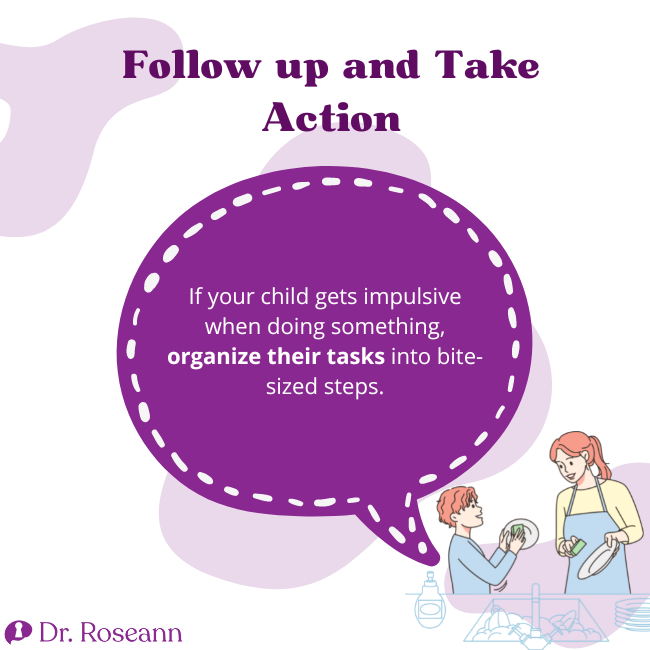
If your child gets impulsive when doing something, organize their tasks into bite-sized steps. For example, allow them to take a five-minute break in a different environment after working for 30 minutes on their homework. Plan short and relaxing activities when taking a break. Make sure you set the alarm. Staying on pause for too long may cause them to become distracted and move on to another task.
#5 Acknowledge your child's patience
Reward your child for being patient when he displays positive behaviors. Impulsive children may behave better when they know what the appropriate behavior is. Keep your patience. It's an essential tool you can use. Overcoming impulse control issues takes time. The process will take time to happen. The key to success is consistency.
#6 Play games that initiate self-control
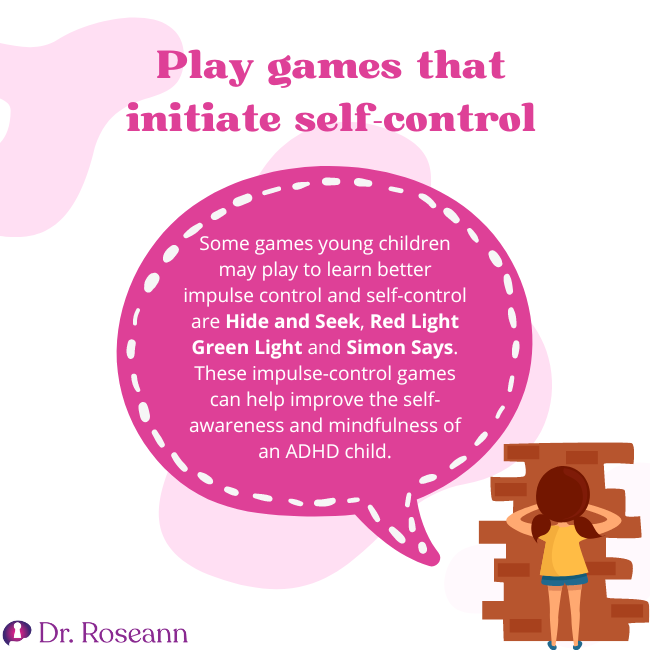
Some games young children may play to learn better impulse control and self-control are Hide and Seek, Red Light Green Light, and Simon Says. These impulse-control games can help improve the self-awareness and mindfulness of an ADHD child.
#7 Learn relaxation techniques
Getting stressed or being on edge will result in an uptick in ADHD impulsivity. Relaxation can help your child control their impulses. If your child needs to get busy, you can make them listen to calming music. Teach them how to breathe deeply throughout the day. Regular exercise can also promote progressive muscle relaxation and supports neurotransmitter function.
Helping Kids with Impulse Control Conditions
If you're a parent concerned about your child's impulsive behaviors, look for options that calm the brain and support you in guiding behavior. Behavior can be unlearned, and new associations can be formed with consistent reinforcement and practice.
Aside from teaching your children how to manage uncomfortable sensations and feelings at home, you also have to help manage their stress. The first step in dealing with impulsivity is calming the brain.
To calm your child's brain, neurofeedback, cognitive behavioral therapy, and a portable PEMF device, like CALM PEMF™, can significantly benefit them. Magnesium supplements also help treat kids with ADHD and poor impulse control.
Citations
Giovannelli, F., Mastrolorenzo, B., Rossi, A., Gavazzi, G., Righi, S., Zaccara, G., Viggiano, M. P., & Cincotta, M. (2016). Relationship between impulsivity traits and awareness of motor intention. European Journal of Neuroscience, 44(7), 2455–2459. https://doi.org/10.1111/ejn.13359
Nidhi, S. (2023, January 13). Review and meta-analysis suggests breathwork may be effective for improving stress and mental health. News-Medical.net. https://www.news-medical.net/news/20230113/Review-and-meta-analysis-suggests-breathwork-may-be-effective-for-improving-stress-and-mental-health.aspx?mibextid=Zxz2cZ
Always remember… “Calm Brain, Happy Family™”
Are you looking for SOLUTIONS for your struggling child or teen?
Dr. Roseann and her team are all about solutions, so you are in the right place!
There are 3 ways to work with Dr. Roseann:
You can get her books for parents and professionals, including: It’s Gonna Be OK™: Proven Ways to Improve Your Child’s Mental Health, Teletherapy Toolkit™ and Brain Under Attack: A Resource For Parents and Caregivers of Children With PANS, PANDAS, and Autoimmune Encephalopathy.
If you are a business or organization that needs proactive guidance to support employee mental health or an organization looking for a brand representative, check out Dr. Roseann’s media page and professional speaking page to see how we can work together.
Dr. Roseann is a Children’s Mental Health Expert and Therapist who has been featured in/on hundreds of media outlets including, CBS, NBC, FOX News, PIX11 NYC, The New York Times, The Washington Post,, Business Insider, USA Today, CNET, Marth Stewart, and PARENTS. FORBES called her, “A thought leader in children’s mental health.”

She is the founder and director of The Global Institute of Children’s Mental Health and Dr. Roseann Capanna-Hodge. Dr. Roseann is a Board Certified Neurofeedback (BCN) Practitioner, a Board Member of the Northeast Region Biofeedback Society (NRBS), Certified Integrative Medicine Mental Health Provider (CMHIMP) and an Amen Clinic Certified Brain Health Coach. She is also a member of The International Lyme Disease and Associated Disease Society (ILADS), The American Psychological Association (APA), Anxiety and Depression Association of America (ADAA) National Association of School Psychologists (NASP), International OCD Foundation (IOCDF) International Society for Neurofeedback and Research (ISNR) and The Association of Applied Psychophysiology and Biofeedback (AAPB).
© Roseann-Capanna-Hodge, LLC 2023
Disclaimer: This article is not intended to give health advice and it is recommended to consult with a physician before beginning any new wellness regime. *The effectiveness of diagnosis and treatment vary by patient and condition. Dr. Roseann Capanna-Hodge, LLC does not guarantee certain results.

